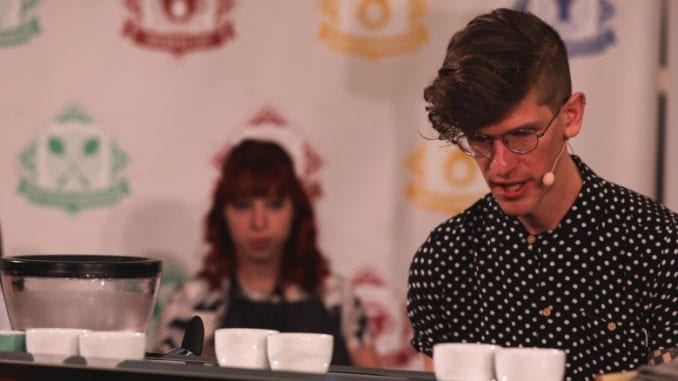
T. Ben Fischer of Elixr Coffee was the 2018 United States Barista Championship runner-up. In this interview, he talks about what he’s learned as a competitor, how he learned to embrace his personality on stage, and the importance of access and representation.
BY ASHLEY RODRIGUEZ
BARISTA MAGAZINE ONLINE
Photos courtesy of Jake Olson for the SCA
A barista performance from T. Ben Fischer is always a delight. One can expect cat references, Disney songs, and an infectious passion from the 2018 United States Barista Championship runner-up, who works for Elixr Coffee in Philadephia. In this interview, T. Ben talks about what he has learned through his years of competing, what needs to change about barista competitions, and his goals for the future.
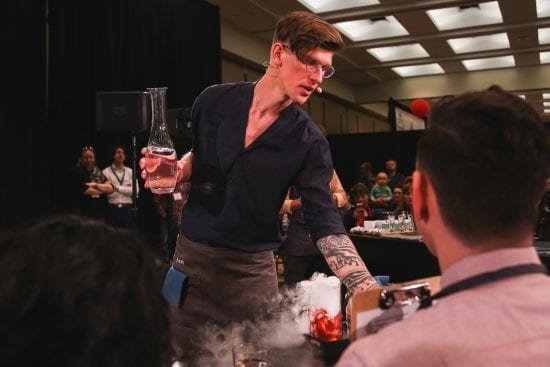
Ashley Rodriguez: Can you tell us a little bit about your coffee background? How did you get to where you are right now?
T. Ben Fischer: The basic story is I needed a job to get through college and I stumbled into Stone Creek Coffee in Milwaukee and applied. The first time I applied I didn’t even get an interview! A few months later I re-tried, landed an interview, and started a job—I had no idea it would bring me to a national stage. I spent a few years working for them, managed their flagship, competed for three seasons, and after a stint at La Colombe, found Elixr Coffee Roasters in Philadelphia, where I work now as a barista.
AR: What coffee did you use at USBC? How did you find it and why did you choose to compete with it?
TBF: I used a naturally processed Gesha from La Palma y El Tucan in Colombia. This year, I had the incredible opportunity to visit origin for the first time (thank you Evan and Elixr!), and the experience was life-changing. I did not realize how little I knew and how much I still have to learn! The first farm I visited was La Palma and it blew my mind. Their hospitality, organization, design, quality … OK, everything is beautiful. Sebastian set up a few cupping tables for us and I kept returning to this coffee. Honestly, everything about it was delicious: dry fragrance (strawberries!), balance, clean, tropical, sweet, sparkling rosé. I could talk way too long about this coffee. I truly fell in love with it and wanted to share not only that feeling about the coffee but also my experiences at origin with the judges.
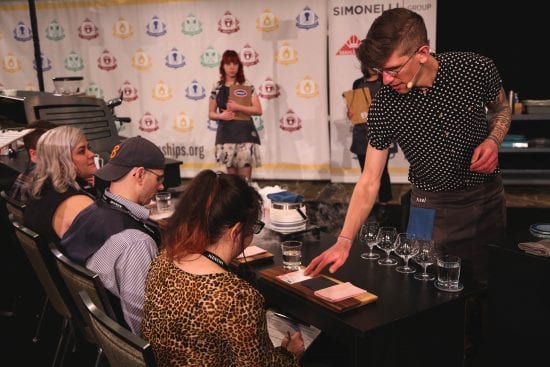
AR: You’re currently a working barista—how did you juggle your job and practice? What does it mean to you that folks working as baristas ended up in the top spots?
TBF: To be honest, I am very fortunate. Evan [Inatome, Elixr’s owner] is a huge supporter of competitions and wanted to see our team do well. Leading up to USBC I had time out of the café to train, and some of that was paid practice time. My manager was incredible and worked with me to get shifts covered so I could spend time training and relaxing. This was my fifth season and the first one that I have had this kind of support, and it made all of the difference. Holly [Bastin], one of my coaches, always reminded me that we are people first and we need to remember that. Eat food, drink water, go for a run, read a book, take care of yourself, and you’ll feel much better—and probably present much better as well.
Having baristas do well in this competition is important, but I think we have more important issues to take a look at. Of course, I would love to see more “working/career baristas” winning and in the finals, but first, I would like to see more diverse representation and increased access to competition. More women, POC, queer competitors. If I had to pick a platform, it would be representation of people, not representation of careers. We are all baristas at heart, so if you’re in sales or packaging or tech, who cares? Find a coffee, fall in love, and be crazy stressed out for a few weeks (months) and have some fun!
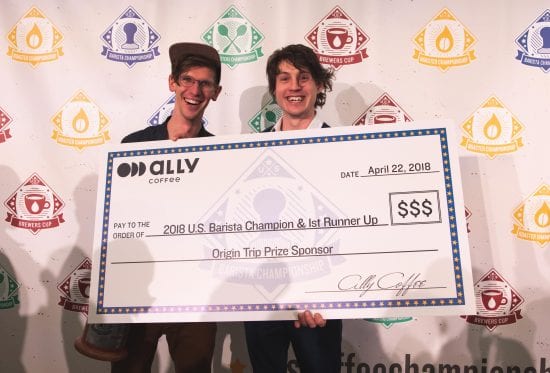
AR: You’ve competed in the past—how was it different this time around?
TBF: It is all about access.
A quick tangent: I attended Black Coffee PDX after Expo, and it was incredibly eye-opening, not simply about competition access, but general access to jobs/safety/pay and the list continues. [Panelist] Ezra [Baker] called out competition heavily, and rightfully so. Many of the rules play into white culture, or rather, prevent other cultures from entering the competition stage. These are issues we need to analyze more intensely. Things are changing, such as the addition of a mandatory bias training for all judges, yet we still have a long way to go.
I have been fortunate to have access to not only great coffee but also an incredible coaching duo. Pete Licata and Holly Bastin were my coaches this year, and I would not have been able to place second without them. Their coaching style is impeccable, from diving into how I dose/distribute/tamp to espresso extraction/tasting. What I love about working with them is at no point was I told what to do; it was a journey we all took together to discover how best to make this coffee. They tapped into who I am as a person and as a coffee professional. It was fun, engaging, and I learned more about myself and others in the process. Stressful of course, but they are my friends, and we have been through some high highs and low lows. I would have spent this season with no one else, and look forward to years of friendship and coaching to come.
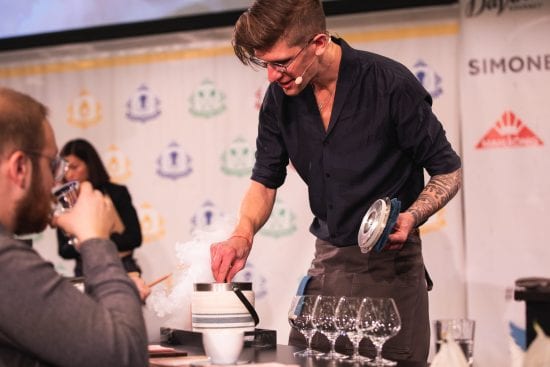
Looking forward, I am tossing around an idea to put together some sort of program that would provide access to this knowledge for folks that normally would not be able to get it. Stay tuned. Also in the meantime, check out Snowdrift Coffee; they are doing some pretty rad education opportunities for the LGBTQ community.
AR: Since you’ve competed in the past, how have you seen yourself grow and change?
TBF: I have become more myself. Pete and Holly have encouraged me from day one to be fully and completely myself. I’m weird as heck. I had cat spoons for my espresso course, silhouettes of my cat on my cards, and Disney music in my playlist. For years I have had people tell me that I need to temper my personality to do well, but it wasn’t until I grew into myself, accepted me for who I am, and showed the world that part of me that I made it to finals. Being on that stage was a feeling I will never forget. Making finals was my win.
My advice: Find your quirk and go with it. We are all odd, so we might as well accept our oddities and have fun.
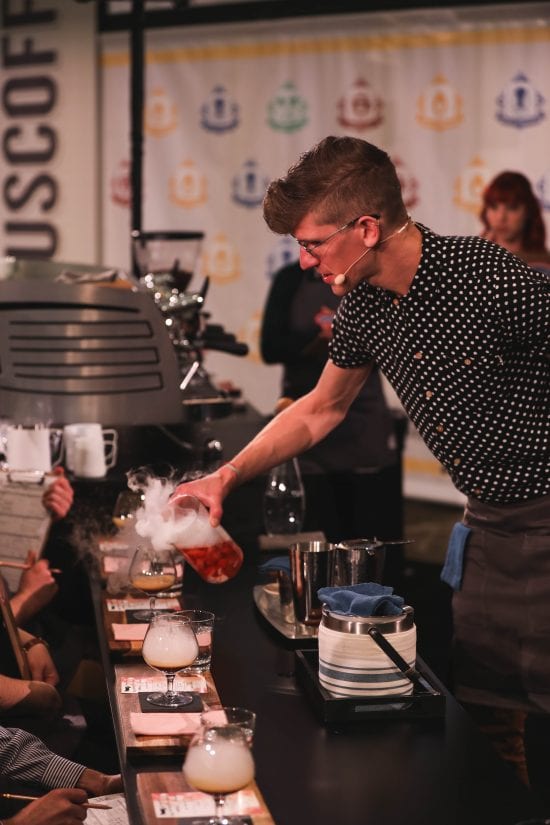
AR: What would you like to see competition be better at?
TBF: I touched on this a little bit already, but we really need more representation. It varies from year to year, but we always return to a lot of men. This year we only had one female finalist. Last year it was six men that qualified from round one to round two, but we had three females in the finals. We’ve had one non-white champion, haven’t had a non-male winner since 2014, and I’m not sure about queer representation.
Looking toward the 2019 season, I want to be a part of that change by working to provide access/training for folks that otherwise would not have it. We need to work within and outside of our respective companies to give opportunities to folks who don’t have them. What does that look like? I am not sure yet, but hit me up in a couple of months and I’ll have a game plan.
AR: What did you hope to achieve by competing? Will you compete again?
TBF: Marginalized communities need a voice. As an openly gay man I can be a voice for some, but I will listen to all. I know so little in the context of discrimination, segregation, and issues in our industry, but I am here to learn, fight, and be a part of the solution. I want to use my platform to bring other voices to the front of the conversation. This might sound like a pipe dream, but we cannot find success or answers without dreaming first.
I do plan on competing again, want to coach someone, and look forward to competing in a much more diverse field of competitors next season. I might have taken second place this year, but that success is simply a representation of all of the people in my life that have poured into me. WE took second, and next year we’re fighting for first.

